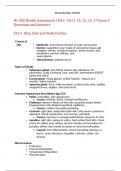lOMoARcPSD|43502630
lOMoARcPSD|435026
Nr-302 Health Assessment I HA1- Ch13, 14, 15, 16, 17 Exam 2
Questions and Answers
Ch13- Skin, Hair and Nails Outline
3 Layers of
skin • Epidermis- inner Basal cell layer & outer Horny layer
• Dermis- supportive layer made of connective tissue and
collagen- nerves, sensory receptors, blood vessels, and
lymphatics and hair follicles, and
sweat glands.
• Subcutaneous- adipose tissue
Types of Glands
• Sebaceous gland- hair follicle sebum, oily substance, for
lubrication. Scalp, forehead, face, and chin. (everywhere EXCEPT
palms and soles)
• Eccrine gland- Sweat glands. Coiled Tubules. Mature at 2
months. Saline solution
• Apocrine gland- thick, milky secretion, creates body odor. (axillae,
anogenital area, nipples, and naval area)
Common Appearance descriptions (pg.223)
• Pallor- unhealthy, pale appearance
o Causes- Anemia, shock, arterial insufficiency
• Erythema- intense redness of the skin caused by excess blood
(Hyperemia) in the dilated superficial capillaries.
o Causes- carbon monoxide poisoning
• Cyanosis- Light skin; dusky blue Dark skin: only severe cyanosis is
apparent. Check Conjunctiva, oral mucosa, nail beds.
o Causes- increase in unoxygenated blood, exposure to cold
• Jaundice- light skin: yellow in sclera, hard palate Dark Skin: check
sclera for yellow near Limbus, do not mistake normal yellow for
jaundice yellow. Best noted on palms or hard and soft palate.
o Caused- liver inflammation, severe hemolytic disease i.e.,
burns, some infections, hepatitis, cirrhosis, sickle- cell
disease
Skin Functions
• Protection
• Prevent Penetration
• Temperature Regulation
• Wound repair
, lOMoARcPSD|43502630
• Vitamin D production
Causes of changes in skin temperature, texture, moisture, mobility, and turgor
• Skin Temperature- Hypothermia, Hyperthermia, Hyperthyroidism
• Skin texture- Hyperthyroidism, hypothyroidism
• Skin Moisture- Diaphoresis due to increased metabolic rate
(thyrotoxicosis, fever, heavy activity), Stimulation of nervous
system (anxiety, Pain), or Dehydration.
• Skin Mobility- edema and scleroderma cause decreased mobility
, lOMoARcPSD|43502630
• Skin Turgor- poor turgor is Dehydration
Lesion and Signs
Traumatic or pathological changes in previously normal structures
• EXAMIN: Color, elevation, pattern or shape, size, location &
distribution on body, Exudate
• Can be Primary (develops on previously unaltered skin) or Secondary (from
itching)
Common types of Primary Lesions (pg.224)
▪ Macule- color change, flat. Less than 1 cm – (Freckles,
hypopigmentation, petechiae, measles, scarlet fever)
▪ Papule- palpable, solid, elevated less than 1 cm (mole, lichen planus,
molluscum, wart (Verruca))
▪ Patch- larger than 1 cm (Mongolian spot, vitiligo, café au lait spot,
chloasma, measles rash)
▪ Plaque- papules join to form surface elevation (psoriasis, lichen planus)
▪ Nodule- solid, elevated, hard or soft, larger than 1cm. (fibroma, intradermal
nevi)
▪ Wheal- superficial, raised, transient, and erythematous;
(mosquito bite, allergic reaction, dermographism)
▪ Tumor- larger than a few CM, firm, deep into dermis (Lipoma, hemangioma)
▪ Urticaria (Hives)- Wheals coalesce to form extensive reaction, intensely
pruritic.
▪ Vesicle-elevated cavity containing free fluid “blister”. Clear
serum flows if ruptured. (chickenpox, herpes zoster, contact
dermatitis)
▪ Bulla- larger than 1 cm, single chambered (Unilocular); rupture
easy (Friction blister, pemphigus, burns, contact dermatitis)
▪ Cyst- encapsulated fluid-filled cavity in dermis, tensely elevating
skin (Sebaceous Cyst)
▪ Pustule- Turbid fluid (pus) I the cavity. (Impetigo, acne)
Common types of Secondary Lesions (pg.224)
▪ Crust- thick dried out exudate when vesicles open up or pop.
Yellow, green, red brown. (Impetigo, weeping eczematous
dermatitis, scab after abrasion)
▪ Scale- Compact, flakes of skin, dry or greasy, silver or white
(Scarlet fever, drug reaction, seborrheic dermatitis, eczema, dry
skin)
▪ Fissure- Linear crack with abrupt edge; extends into dermis (Cheilosis at mouth
corners)
, lOMoARcPSD|43502630
▪ Erosion- scooped out but shallow depression. Moist but no
bleeding, no scar because it doesn’t go into dermis
▪ Ulcer- Deeper depression extending into dermis, irregular
shape, may bleed, leaves scar (stasis, ulcer, pressure injury)
▪ Excoriation- Self- inflicted abrasion, superficial, scratches from intense itching
(insect bites, scabies, dermatitis, varicella)
▪ Scar- after skin tissue is repaired, normal tissue is lost and
replaced with connective tissue. (Acne, healed wounds)
▪ Atrophic scar- skin is depressed, loss of tissue. (Striae, stretch marks)
▪ Lichenification- prolonged, intense scratching producing papules.
▪ Keloid- benign excess of scarring beyond original site.




